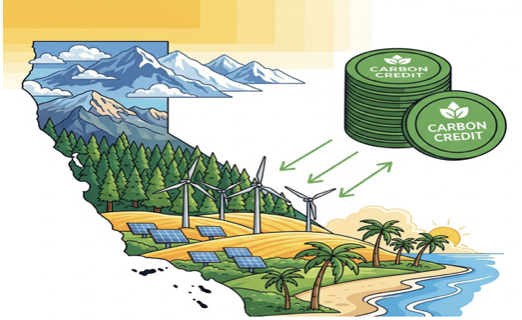California continues to lead the U.S. in climate regulation, and its latest wave of legislation—SB253, SB261, and AB1305—may redefine how companies account for and manage their emissions. These new climate disclosure laws will not only transform corporate reporting but are poised to deeply impact the carbon credit landscape, both within California and beyond.
What Just Happened: A Quick Overview
As reported in This Week in Energy, a federal judge has upheld California’s sweeping climate disclosure laws despite legal challenges. This ruling clears the way for enforcement and solidifies California’s role as the country’s most ambitious state-level climate regulator. It also reaffirms the state’s authority to demand greenhouse gas (GHG) and climate risk disclosures from companies doing business in California—whether they’re headquartered there or not.
What Are Scope 1 and Scope 2 Emissions?
Before diving into the legal implications, it's important to understand the basic terminology companies are now required to report:
- Scope 1 emissions: These are direct GHG emissions from sources that a company owns or controls, such as fuel burned in company-owned vehicles or boilers.
- Scope 2 emissions: These are indirect GHG emissions from the generation of purchased electricity, steam, heat, or cooling. They occur at the power plant but are attributed to the company using the energy.
Together, these scopes capture a company’s operational carbon footprint and are the initial focus of California’s mandatory disclosures under SB253.
Who Must Comply — and Why Revenue Matters
California’s new laws are tightly linked to company revenue thresholds, targeting the largest businesses operating in the state:
- SB253 applies to companies with over $1 billion in annual global revenue.
- SB261 covers those with over $500 million in annual revenue.
- AB1305, which governs the marketing of carbon offsets, applies broadly—regardless of revenue—to any entity making climate claims in California.
This means the laws apply not only to oil companies and manufacturers, but also to tech giants, retailers, banks, logistics providers, and multinationals—even if their headquarters are elsewhere.
Because these firms will now be required to report Scope 3 emissions (value-chain emissions) starting in 2027, the ripple effect will extend to smaller suppliers and contractors, especially those serving large enterprises.
What Are California Carbon Credits?
California’s carbon credit system is a cornerstone of its Cap-and-Trade Program, designed to reduce greenhouse gas (GHG) emissions through market-based incentives.
1. Allowances (Compliance Credits)
- Issued by the California Air Resources Board (CARB)
- One allowance equals permission to emit one metric ton of CO₂e
- Allocated or auctioned to companies—surplus allowances can be traded
- Primarily used by large emitters to meet emissions caps
2. Offsets
- Represent verified GHG reductions outside of regulated sources (e.g., forestry, methane capture)
- CARB-approved, with strict criteria around additionality and permanence
- Can contribute up to 4% of a regulated entity’s compliance requirement
There's also a voluntary market, where companies purchase credits beyond legal obligations, often to meet sustainability goals.
How the New Laws Will Affect Carbon Credits
The confirmation that these laws stand opens the door for meaningful shifts in how carbon credits function in California’s landscape.
1. Demand Surge for Quality Credits
With Scope 1, 2, and 3 emissions disclosure now unavoidable, corporations will lean on high-integrity offsets to complement their reduction strategies.
2. Greenwashing Risks Heightened
Under AB1305, companies must provide detailed disclosures around offset claims—focusing on methodology, verification, location, and retirement. This raises stakes for low-quality providers.
3. Offset Reliance May Shift
Mandatory climate-risk reporting (per SB261) nudges firms toward internal reductions and responsible offset usage rather than defaulting to credits for reputation management.
4. Expanding Market Participation
Even non-compliance-bound firms may voluntarily engage in credit markets to bolster their climate strategies—broadening the buyer base.
5. California Setting National Standards
With federal rules lagging, these laws could become prototypes for other states—or even federal frameworks—enhancing the credibility and reach of California carbon credits.
Timeline to Watch
Milestone Deadline
Legal hurdle cleared 2025 (federal ruling)
Final CARB regulations released By July 1, 2025
Scope 1 & 2 emissions reporting begins 2026 (based on FY 2025 data)
Scope 3 emissions reporting begins 2027 (CARB to set schedule)
Climate-risk reporting begins By January 1, 2026 (biennially thereafter)
Despite some legal pushback, California is asserting its position: these laws are here to stay. natlawreview.com+11wsj.com+11thisweekinenergy.substack.com+11
Final Thoughts: Integrity Is the New Currency
These landmark rulings underscore that climate disclosure is mandatory—and the days of vague, unverifiable carbon claims are numbered.
For companies:
- Begin upgrading emissions tracking systems now
- Evaluate offset strategy through the lens of transparency and durability
For offset providers:
- Demand for high-quality, verifiable projects will rise—be ready to meet the bar
For investors and policymakers:
- California's path is increasingly becoming a benchmark for climate accountability nationwide




